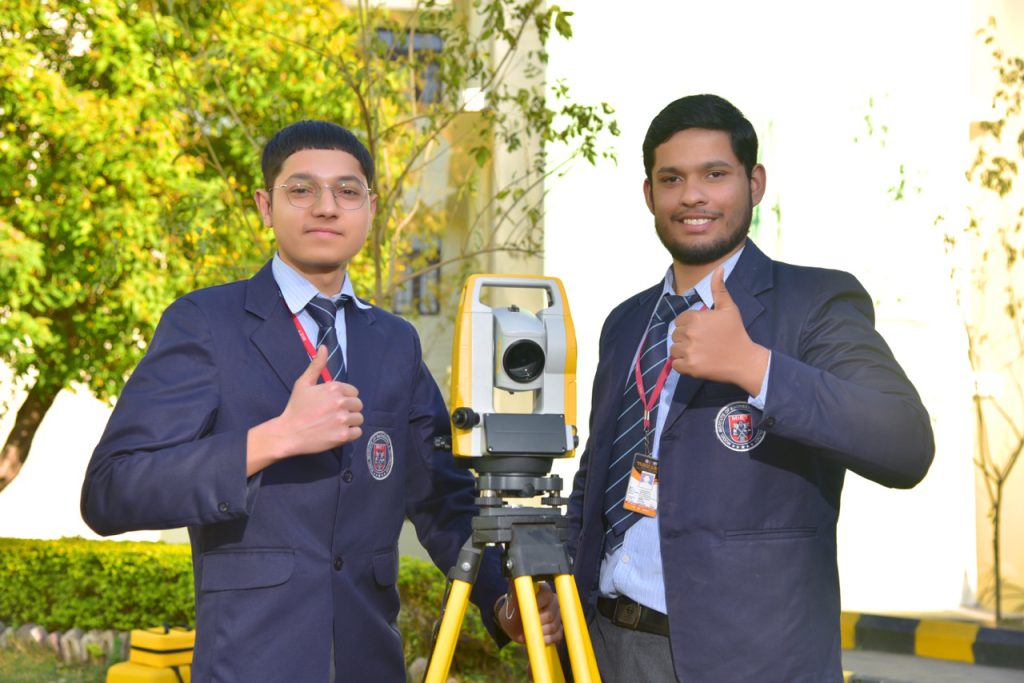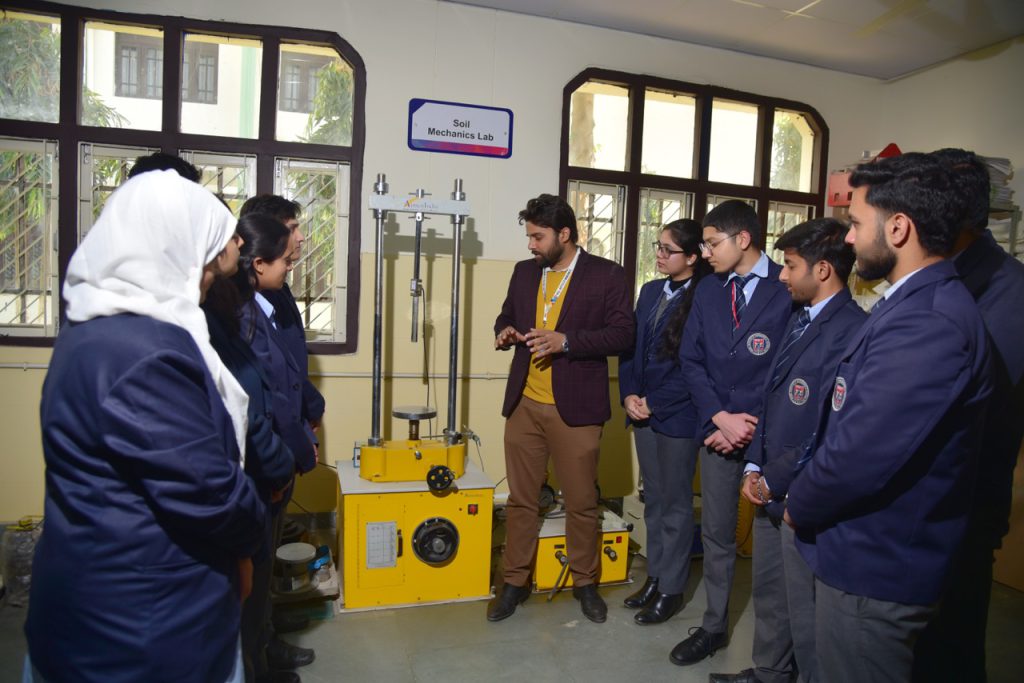Civil Engineering
- 4 Year Course
- Intake: 60
Why B.Tech Civil Engineering Course at MIET
Build a strong foundation with practical skills, industry exposure, and expert mentorship. Pursue a 20-credit minor specialization from IIT-Jammu alongside your B.Tech—thanks to a unique MIET-IIT collaboration. With hands-on training, modern labs, and software tools like AutoCAD and STAAD Pro, set yourself apart and become future-ready in infrastructure, sustainability, and innovation.
20 Core Engineering Courses
Covering fundamental and advanced areas in Civil Engineering such as Strength of Materials, Structural Analysis, Fluid Mechanics, Geotechnical Engineering, Environmental Engineering, and Transportation Engineering.4 Industry-Integrated Labs/Project-Based Courses
Designed as practical, hands-on modules that integrate industry practices and tools. These include Survey Camps, Minor Projects, and a two-phase Major Project.- 6 Elective Courses
Offered in the higher semesters, these allow students to explore specialized interests such as Earthquake Engineering, Traffic Planning, Advanced Concrete Technology, or Smart City Design.
Mandatory Industry Internship: Students undergo a minimum of 6 to 8 weeks of industry internship typically during the summer after the 4th or 6th semester.
Field Training: Hands-on exposure through survey camps, site visits, and lab-based learning with real-world tools like AutoCAD, STAAD Pro, and Primavera.
Industry Tie-ups: Collaborations with leading companies in construction, infrastructure, smart city development, and consulting enable students to intern with reputed names
Click here to view
- 50% marks and above in 12th Class.
- Any State or National Level Entrance Exam (CUET) or MET (MIET Entrance Test)
Specializations
The Civil Engineering program at MIET offers students the opportunity to specialize in eight diverse and future-ready domains, each designed to equip them with cutting-edge technical skills, practical knowledge, and problem-solving capabilities. These rigorous and forward-looking specializations provide students with a deep understanding of both core engineering areas and emerging technological fields.
Core Civil Engineering Specializations
Design and analyze buildings, bridges, and infrastructure with a focus on safety, durability, and sustainability.
Subjects Offered:
Structural Analysis
Design of Steel and RCC Structures
Earthquake Engineering
Advanced Concrete Technology
Finite Element Method
Career Options:
Structural Engineer
Bridge Design Engineer
Construction Consultant
Infrastructure Planner
Earthquake Safety Consultant
Plan and manage efficient and smart transportation systems, with insights into traffic engineering and urban mobility.
The Transportation Engineering specialization is provided in Association with IIT Jammu
Subjects Offered:
Highway Engineering
Traffic Engineering
Urban Transportation Planning
Pavement Design
Intelligent Transport Systems
Career Options:
Transport Planner
Highway Engineer
Traffic Engineer
Urban Infrastructure Analyst
Road Safety Auditor
Develop sustainable water management systems, including irrigation, flood control, and hydraulic infrastructure. This specialization is provided in Association with IIT Jammu
Subjects Offered:
Hydrology and Irrigation Engineering
Water Resource Systems
Hydraulic Structures
Groundwater Engineering
Watershed Management
Career Options:
Water Resource Engineer
Irrigation Consultant
Dam and Canal Engineer
Hydrology Analyst
Environmental Consultant
Tech-Integrated Specializations
Apply intelligent systems for predictive analysis, structural health monitoring, and smart infrastructure
Integrate sensors and smart devices in infrastructure to enable real-time monitoring and automation.
Harness data-driven insights for project planning, risk analysis, and resource optimization in civil projects
Manage and secure engineering data and operations using cloud platforms and digital security frameworks.
Program Outcomes & Objectives
Graduates from the Computer Science program at MIET are expected to attain or achieve the following Program Educational Objectives (PEOs) within a few years of graduation:
- Successfully apply fundamental knowledge of electrical engineering in an innovative manner to solve real-world challenges in emerging domains.
- Build successful careers in diverse domains and take on higher responsibilities in industry, academics and entrepreneurship to create significant value for all stakeholders.
- Demonstrate professional growth and development in their chosen field or program towards an advanced degree and to achieve their specific career goals.
- Build a reputation for excellence, leadership and ethics.
1. Engineering Knowledge: Apply the knowledge of mathematics, science, engineering
fundamentals, and an engineering specialization to the solution of complex engineering problems.
2. Problem Analysis: Identify, formulate, review research literature, and analyze complex
engineering problems reaching substantiated conclusions using first principles of mathematics,
natural sciences, and engineering sciences.
3. Design/development of solutions: Design solutions for complex engineering problems and
design system components or processes that meet the specified needs with appropriate
consideration for the public health and safety, and the cultural, societal, and environmental
considerations.
4. Conduct investigations of complex problems: Use research-based knowledge and research
methods including design of experiments, analysis and interpretation of data, and synthesis of the
information to provide valid conclusions.
5. Modern tool usage: Create, select, and apply appropriate techniques, resources, and modern engineering and IT tools including prediction and modeling to complex engineering activities with an understanding of the limitations.
6. The engineer and society: Apply reasoning informed by the contextual knowledge to assess societal, health, safety, legal and cultural issues and the consequent responsibilities relevant to the professional engineering practice.
7. Environment and sustainability: Understand the impact of the professional engineering solutions in societal and environmental contexts, and demonstrate the knowledge of, and need for sustainable development.
8. Ethics: Apply ethical principles and commit to professional ethics and responsibilities and norms of the engineering practice.
9. Individual and team work: Function effectively as an individual, and as a member or leader in diverse teams, and in multidisciplinary settings.
10. Communication: Communicate effectively on complex engineering activities with the engineering.
11. Project management and finance: Demonstrate knowledge and understanding of the engineering and management principles and apply these to one’s own work, as a member and leader in a team, to manage projects and in multidisciplinary environments.
12. Life-long learning: Recognize the need for, and have the preparation and ability to engage in independent and life-long learning in the broadest context of technological change.
1. Demonstrate fundamental knowledge in programming, data structures, databases, networks, operating systems, software engineering, and discrete mathematics and possess knowledge of cloud computing, big data, artificial intelligence and other domains in vogue.
2. Demonstrate competence in designing, implementing and testing a computer or software system, solving a real-world problem, by utilizing advanced technologies, platforms and tools.
Do you have more questions?
Key Features
UltraTech Centre of Excellence (CoE) for Advanced Building Materials



Saajan Dutta
B.Tech Civil Engineering (2020-2024)
News & Events
Alumni in Spotlight – Mr. Vaneet Gupta
Meet Mr. Vaneet Gupta, an esteemed MIET alumnus from the CSE Batch of 2000-2004, currently thriving as the Head of Business Systems
Building Financial Wisdom: Stock Portfolio & Investment Strategies
MIET, in collaboration with the Institution’s Innovation Council (IIC), organized an engaging session on stock portfolio building and investment strategies with Mr.
Industrial Visit to Rail Coach Factory, Kapurthala
MBA students from the School of Management, MIET, visited the Rail Coach Factory, Kapurthala, a leading manufacturing unit under Indian Railways. This
How to Apply?
- You Apply
Tell us a little about yourself and we’ll help with the rest. Our convenient online application tool only takes 10 minutes to complete.
- We Connect
After you submit your application, an admissions representative will contact you and will help you to complete the process.
- You Get Ready
Once you’ve completed your application and connected with an admissions representative, you’re ready to create your schedule.

